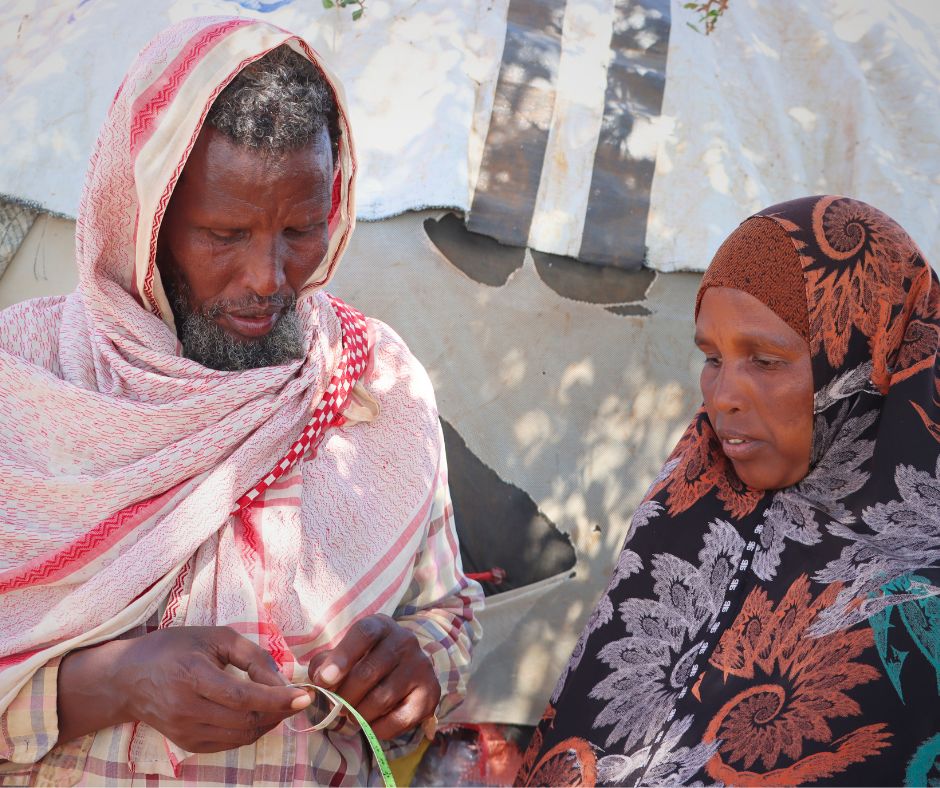Under a vast, sun-baked sky, the village of Adiile in Somalia’s Bay region has weathered its share of struggles. Its people, resilient as the hardy acacia trees that dot the landscape, rely on mixed subsistence farming to survive—raising livestock and growing maize, millet, and beans. Yet, even the most self-reliant families find themselves vulnerable when nature turns unpredictable. For Luley, a young mother in Adiile, the heavy rains of spring 2023 brought more than just a poor harvest. They almost took her son.
Luley’s 15-month-old son, Meyser Aliow, had always been active and full of energy, but the rains had triggered more than a failed crop. They set off a chain reaction that affected her family’s health and livelihood. One day, little Meyser started coughing, then came fever and vomiting. Soon, he was too weak to stand. “He used to hold on to things to stand,” Luley recalled, “but then he started losing that. He became weaker, frail by the day, just flesh and bones.” Alarmed, Luley—already pregnant with her third child—sought help.
For families like Luley’s, access to healthcare in rural Somalia can be a matter of life and death. Somalia health system, though slowly improving, remains underdeveloped, especially in remote areas. Luley’s journey to get treatment for Meyser took her to the Bayhaaw Stabilization Center, one of the medical facilities available in the area, supported by Action Against Hunger under the Caafimaad Plus Consortium—a collaborative program aimed at improving healthcare access in Somalia.
Somalia has been grappling with chronic malnutrition for years, with rates exacerbated by droughts, floods, and conflict. The Bay region is among the hardest hit, where the Food Security and Nutrition Analysis Unit (FSNAU) reports acute malnutrition levels hovering at emergency thresholds, particularly in children under five. The Caafimaad Plus consortium, funded by the European Union Humanitarian Aid (ECHO), focuses on addressing these issues, delivering not only nutrition support but also bolstering Somalia’s broader healthcare systems.
At Bayhaaw, the team immediately recognized the seriousness of Meyser’s condition. He was diagnosed with severe acute malnutrition (SAM), a critical condition that, if untreated, can lead to death. Malnutrition cases like Meyser’s often go unnoticed until they reach an advanced stage, as mothers struggle to identify symptoms or access early interventions. Fortunately, Action Against Hunger’s outreach workers—part of the Caafimaad Plus project—had identified and referred Meyser for treatment. This referral was part of a larger community-based surveillance effort designed to ensure that vulnerable children do not fall through the cracks.
At the stabilization center, Meyser received specialized therapeutic feeding, including F-75 and F-100 formulas, specifically designed for malnourished children to gain strength and recover. For days, the medical team worked tirelessly to stabilize his condition, treating underlying infections and ensuring proper nutritional intake. “The staff gave him medicines and food that his little body needed,” Luley said, relief etched in her voice. Slowly, the boy who had once been too weak to sit up began to smile again.

During this emotional time, Luley gave birth to her third child, Abdullahi, with the assistance of the same healthcare facility. This “double blessing” as she calls it, was a moment of profound relief after weeks of fear. “Watching Meyser recover and welcoming a new life at the same time—it was a blessing,” she said.

The work of Caafimaad Plus and its partners in Somalia goes beyond emergency care. Recognizing the long-term need for nutrition education, the health facility also provides Infant and Young Child Feeding (IYCF) sessions. Here, Luley, like many other mothers, learned about exclusive breastfeeding, the importance of a diverse diet, and how to recognize early signs of malnutrition. These sessions are part of a broader strategy to prevent malnutrition before it reaches crisis levels.
The situation in Somalia remains dire. More than 1.6 million children are projected to face acute malnutrition this year, according to FSNAU data. But the Caafimaad Plus consortium is part of a growing network of interventions offering hope. Funded by EU Humanitarian Aid, this Consortium brings together international NGOs like Action Against Hunger and four other international Aid organizations, Somali government agencies, and local community organizations. Together, they aim to create sustainable healthcare solutions that address not only immediate needs but also the systemic challenges that perpetuate hunger and malnutrition.
In a country where nearly 60% of the population lives in rural areas with limited access to healthcare, these coordinated efforts are vital. Action Against Hunger, one of the lead organizations in the fight against malnutrition, has been working in Somalia for decades. Their programs focus on emergency response, long-term resilience, and sustainable food systems. In 2023 alone, the organization reached over 2.6 Million people with life-saving treatments like the one that saved Meyser.
Luley’s story, though full of hardship, is one of hope. Through the collective efforts of organizations like Action Against Hunger and the backing of the Caafimaad Plus Consortium, families across Somalia are finding the support they need to overcome life-threatening challenges. “Meyser is running around again,” Luley said with a smile. “I am thankful for everyone who helped make that happen.”
As Somalia continues to build its healthcare infrastructure, the story of families like Luley’s serves as a reminder that, with the right resources and partnerships, progress is possible. Families can overcome adversity, and children like Meyser can grow up healthy and strong, contributing to a brighter future for their communities and their country.








